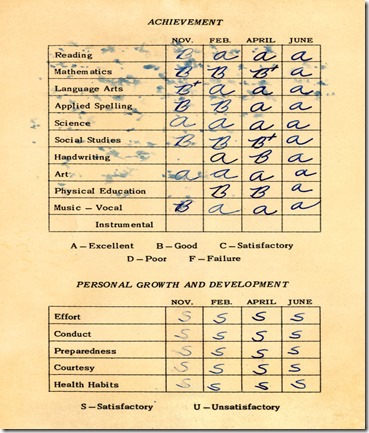
A Perfect Brutality
My dad was pretty hard on me growing up. No matter what I did, he wanted me to do it better, especially in school. If I got a B on a test, he wanted me to get an A, and told me so. If I brought home an A, he wanted an A+. If I answered 49 out of 50 questions correctly and got an A+, he’d want to know why I missed that one question. And if I got a 100, that was just proof that I could do it and he’d expect it all the time.
I rationalized it by saying that he was pushing me to be the very best that I could be, which is good in a way, but the result was that I always felt inadequate. I could never measure up.
The drive for perfection was, in fact, brutal.
If you are thinking right now that my father was being over-demanding, unrealistic, and even cruel, you’d be right.
If that’s how my father really was.
Which he wasn’t.
I’m just making a point.
Which is that that is how a lot of us think about God and sin and judgment and even salvation.
It’s all based around perfection: our inability to achieve or maintain it, God’s sending us to hell because of our imperfection, and his need to kill a perfect sacrifice to satisfy his need for perfect justice.
Our theology is pretty brutal, which means that our view of God is often brutal, and if you think that only matters to pastors and theologians, think again.
Our culture is heavenly influenced by Christian tradition and theology, even among those who are not themselves Christian, and this brutal perfectionism plays itself out in ways large and small:
· In the way, we relentlessly criticize our leaders or would-be leaders. No candidate for office is perfect, some less so than others, but listening to the attacks—and they are attacks—makes you wonder if anyone would be good enough. It’s not for nothing that various Christian groups are often the loudest and harshest voices.
· In the way that some mothers constantly push themselves to make sure their children have every opportunity to be successful in whatever they want to be or do, running themselves into the ground and feeling guilty and inadequate for just wanting to stay home and do nothing for a change. And then on Mother’s Day the church holds up “The Proverbs 31 Woman” as the ideal to strive for.
· In the way that masculinity is defined by physical strength, virility, power, and the quest to conquer. In any pack there is only one alpha male, and all the other males either submit to him (losers!) or look for ways to attack and replace the alpha. Unfortunately there are some Christian men’s movements that promote such a view of masculinity. If you are small, weak, out-of-shape, don’t like sports or don’t know how to fix a car, sorry.
Perfectionism is not biblical. God never expected it. What loving father would? As I’ve written before, Genesis 1 doesn’t show God creating create a perfect world, it shows that he created one with enormous potential (good, good, good, good, good, then very good), which among many things means that it—that we—aren’t yet what we will be, and God has enough patience and grace to allow us to get there.
Angela was in the 4th grade before she got her first B on a report card. She showed it to me with tears in her eyes, hopefully not out of fear but out of disappointment. I said to her, “Whoah, hold on: we don’t cry over B’s. We can cry over F’s, we can cry over D’s, and we’ll have a talk about C’s.
“But we aren’t crying over B’s.”
A degree from the University of Maryland and two masters degrees later, I’d say she did pretty well.
(By the way, I myself never cried over B’s, but I’m pretty sure my dad would have said the same thing. I got it honest. Thanks Dad.)

 I am a lifelong student of the Bible, and have been a pastor for over twenty-five years. My desire through this blog is to help people see things in the intersection of Scripture and real life that they might have missed. The careless handling of the Bible is causing a lot of problems in our churches and our culture--and is literally turning people away from the church, and, sometimes, God. I hope to treat Scripture with the respect it deserves, and, even if you don't agree with what I say, give you some insight.
Feel free to leave a comment. I promise to respond to you. All I ask is that you be respectful in your comments.
I am a lifelong student of the Bible, and have been a pastor for over twenty-five years. My desire through this blog is to help people see things in the intersection of Scripture and real life that they might have missed. The careless handling of the Bible is causing a lot of problems in our churches and our culture--and is literally turning people away from the church, and, sometimes, God. I hope to treat Scripture with the respect it deserves, and, even if you don't agree with what I say, give you some insight.
Feel free to leave a comment. I promise to respond to you. All I ask is that you be respectful in your comments. 
Connect with Me